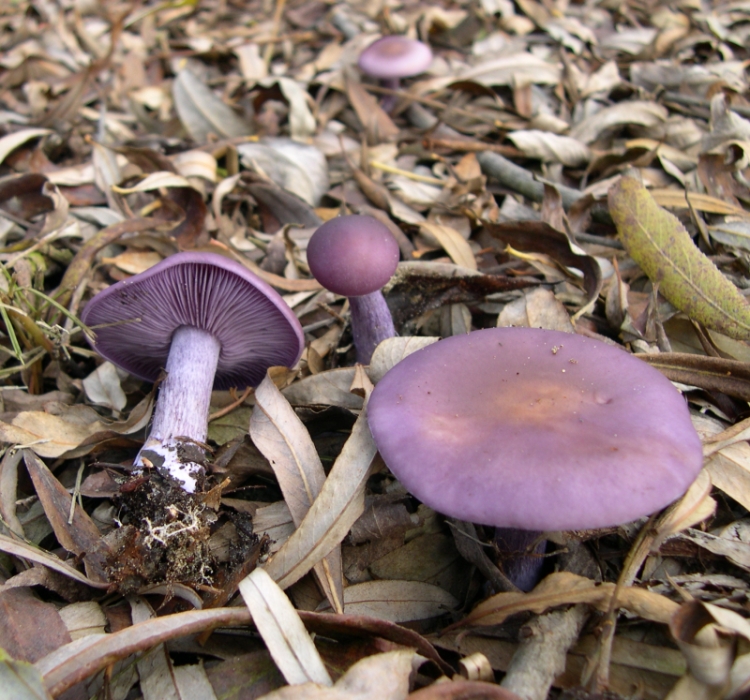- Blewit
:"This article discusses blewit mushrooms. A number of subjects share similar spellings. See
Blewitt andBluet for disambiguation.
image_caption = Wood blewit ("Clitocybe nuda")
image_width = 250px
name = Blewit
regnum =Fungi
divisio=Basidiomycota
classis=Basidiomycetes
ordo=Agaricales
familia=Tricholomataceae
genus = "Clitocybe "
subdivision_ranks = Species
subdivision = "Clitocybe nuda" (Bull.:Fr.) H.E. Bigelow & A.H. Sm.
"Clitocybe saeva" (Fr.) H.E. Bigelow & A.H. Sm.mycomorphbox
name = Clitocybe nuda
hymeniumType=gills
capShape = convex
capShape2=umbonate
whichGills = decurrent
which gills2 = emarginate
stipeCharacter=bare
sporePrintColor=pink
ecologicalType=saprotrophic
howEdible=edibleBlewit refers to two closely-related species of edible
agarics in the genus "Clitocybe ", the wood blewit ("Clitocybe nuda") and the field blewit ("Clitocybe saeva"). Both species are treated by some authorities as belonging to the genus "Lepista ".Classification
Both species have been treated by many authorities as belonging to the "Clitocybe" segregate genus "
Lepista ". Recent molecular research suggests the genus "Lepista" is nested within "Clitocybe ". [Moncalvo JM. et al. (2002). [http://www.biology.duke.edu/fungi/mycolab/publications/117clades.html One hundred and seventeen clades of euagarics.] "Molecular Phylogenetics and Evolution" 23:357–400] .Edibility
Both wood blewits and field blewits are generally regarded as edible, but they are known to cause
allergic reactions in sensitive individuals. This is particularly likely if the mushroom is consumed raw, though allergic reactions are known even from cooked blewits. Wood blewits contain the sugartrehalose , which is edible for most people.Field blewits are often infested with fly larvae and don't store very well; they should therefore be used soon after picking.
Wood blewit
The wood blewit ("Clitocybe nuda" = "Lepista nuda" = "Tricholoma nudum"), is an edible
mushroom , found in bothconiferous anddeciduous woodlands. It is especially common where there is a large amount ofduff built up on the forest floor. It is a fairly distinctive mushroom which is widely eaten, though there is some caution about edibility. Nevertheless it has been cultivated in Britain,Holland andFrance .cite book | author = Carluccio A | year = 2003 | title = The Complete Mushroom Book | publisher = Quadrille | ISBN = 0847825566]Description
This mushroom can range from lilac to purple-pink. Some North American specimens are duller and tend toward tan, but usually have purplish tones on the stem and gills. The gills are attached to the short, stout stem. Mature specimens have a darker color and flatter cap; younger ones are lighter with more convex caps. Wood blewits have a very distinctive odor, which has been likened by one author to that of frozen orange juice. [Arora, David. (1986). "Mushrooms Demystified". Berkeley, CA: Ten Speed Press. ISBN 0898151694]
Wood blewits can be confused with certain purple "
Cortinarius " species, many of which may be poisonous. Wood blewits can be easily distinguished by their odor, as well as by theirspore print . Wood blewits have a light (white to pale pink) spore print; "Cortinarius " species produce a rusty brown spore print after several hours on white paper.Distribution and habitat
The wood blewit is found in Europe and North America and is becoming more common in Australia, where it appears to have been introduced. It is a
saprotrophic species, growing on decaying leaf litter.Field blewit
The field blewit ("Clitocybe saeva" = "Lepista saeva") is a
mushroom similar to thewood blewit . It is commonly found growing in open plains.Description
The convex cap is light cream-brown with a smooth texture. The ringless stem is thin and has light purple-blue colour, hence an alternative name Blue-Leg.
Distribution and habitat
It prefers to grow in grasslands and dirt areas across
Europe .Footnotes
External links
* [http://www.mushroomexpert.com/clitocybe_nuda.html "Clitocybe nuda / Lepista nuda: The Blewit"] by Ron Meyers, "MushroomExpert.Com", December 2003.
* [http://botit.botany.wisc.edu/toms_fungi/nov98.html Clitocybe nuda - Tom Volk's Fungus of the Month for November 1998]
* [http://books.google.com/books?vid=ISBN0898153883&id=87ct90d4B9gC&pg=RA31-PA2&lpg=RA31-PA2&ots=4Oo62AG8Ni&dq=arora+rain+blewit&sig=xpRtrfWu5owPFMtACE-hKALD77A#PRA31-PA2,M1 All that Rain Promises and More - Blewit]
Wikimedia Foundation. 2010.

